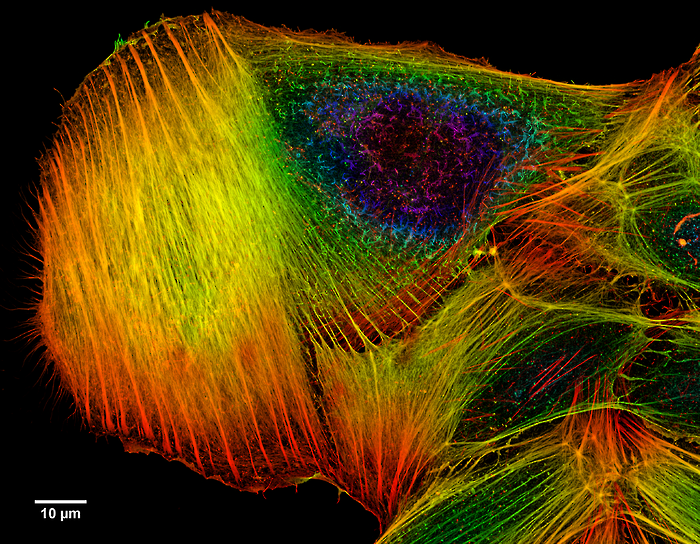Biophysics: how the worlds of mechanics and molecular biology are intersecting
Sofia Weiss discusses how physical principles are transforming our understanding of how cells work

Cells are the fundamental units of life – all 37.2 trillion that constitute our bodies. At a basic level, a cell’s primary functions are to grow, replicate, and divide. Survival, at least for a sufficient length of time, is indispensable to these other functions. However, as humans, we want more: not only must our cells to provide us with a length of life that means we can reproduce; we would also like to guarantee ourselves a long and healthy existence, free of disease. Given this tenet it is unsurprising that biological and health-related research enterprises have pockets much more deeply lined, on average, than institutions of physics. A controversial question arises herein: have the physicists migrating to cell biology in recent decades simply been enticed by higher funding levels of disease-oriented research, or does physics really play a governing role in cellular physiology?
“This difference of approach is extremely helpful in guiding biologists as to which details are important”
Molecular and cell biology, to a large extent, are about proteins and their interactions. The ability to perturb a specific protein inside a cell and observe the consequences has led to an astonishing number of advances in our understanding of cellular function, and has – superficially at least – accorded with the perception that cells are slaves to their genetics and their chemistry. However, these successes have oft overshadowed a critical fact: cells are not isolated bags of proteins. The inside of a cell has structure, and this structure is not static. In addition, cells must live in and interact with the environment, which is often unpredictable and not always favourable; therefore, in order to grow, move, and survive, cells must be able to produce force. Physics must matter.
Cells possess numerous proteins that convert chemical energy into useful work. For example, kinesins and dyneins haul cargo around the cell; myosin molecules can bind to actin filaments and exert forces, the basis of how our muscles work; other molecules rotate, such as the membrane protein that synthesises the molecules that are the prime fuel of our cells. These molecules all act as physical motors, harnessing molecular binding energies to satisfy the second law of thermodynamics: that the degree of disorder in a system must always increase with time.
Typically, binding of an ion or molecule leads to a conformational change in the protein, which can act like a power-stroke in the motor. Hydrolysis of energy or release of the bound ion then returns the motor to its original state, thereby completing the cycle. Physics provides the best way to characterise these molecular motors: the force-velocity relationship, pioneered by Cambridge’s own Archibald Hill. Indeed, in recent years optical trapping methods and other biophysical experiments have provided a wealth of quantitative information for the function of such engines – in a way pure biology or chemistry could not have.
Further vital roles of physics in cell biology are in understanding how cells crawl, glide, swim, and twitch; all ‘lumped in’ under the bracket of cell motility. Physics is indispensable too in the interaction of cells with the environment, the basis of homeostasis. For example, many cells can sense and respond to the stiffness of the surrounding environment, which is known as mechanosensing, and use these messages as the basis for encoding responses: where to move or not to move, or even whether to proliferate or perish.
This difference of approach, in examining a high-level behaviour and extrapolating general principles from it, is extremely helpful in guiding biologists as to which details are important. Biophysics holds much promise, and may yet have the most success in providing a simpler view of the astounding complexity that we see in cellular biology
 News / Eight Cambridge researchers awarded €17m in ERC research grants27 December 2025
News / Eight Cambridge researchers awarded €17m in ERC research grants27 December 2025 News / Clare Hall spent over £500k opposing busway 24 December 2025
News / Clare Hall spent over £500k opposing busway 24 December 2025 Comment / League tables do more harm than good26 December 2025
Comment / League tables do more harm than good26 December 2025 Comment / The ‘class’ of Cambridge24 December 2025
Comment / The ‘class’ of Cambridge24 December 2025 News / Caius mourns its tree-mendous loss23 December 2025
News / Caius mourns its tree-mendous loss23 December 2025









